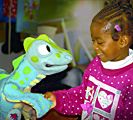How the Well-Baby Program Supports Healthy Child Development

Check out our blog for social-emotional learning articles, news, and more!

Bywater, T., Hutchings, J., Whitaker, C., Evans, C., and Parry, L. (2011). The incredible years therapeutic dinosaur programme to build social and emotional competence in welsh primary schools: study protocol for a randomised controlled trial. Trials, 12:39.
The aim of this paper is to present the research protocol for the randomised controlled trial (RCT) designed to primarily establish whether the IY Therapeutic Dinosaur School Programme, when delivered as a school-based targeted intervention, improves at risk children's social, emotional and behavioural competencies compared with a waiting list control condition.
Abstract
Background: School interventions such as the Incredible Years Classroom Dinosaur Programme targets pupil behaviour across whole classrooms, yet for some children a more intense approach is needed. The Incredible Years Therapeutic Dinosaur Programme is effective for clinically referred children by enhancing social, problem-solving skills, and peer relationship-building skills when delivered in a clinical setting in small groups. The aim of this trial is to evaluate the effectiveness of the Therapeutic Programme, delivered with small groups of children at high-risk of developing conduct disorder, delivered in schools already implementing the Classroom Programme.
Methods/Design: This is a pragmatic, parallel, randomised controlled trial. Two hundred and forty children (aged 4-8 years) rated by their teacher as above the ‘borderline cut-off’ for concern on the Strengths and Difficulties Questionnaire, and their parents, will be recruited. Randomisation is by individual within blocks (schools); 1:1 ratio, intervention to waiting list control. Twenty schools will participate in two phases. Two teachers per school will deliver the programme to six intervention children for 2-hours/week for 18 weeks between baseline and first follow-up. The control children will receive the intervention after first follow up. Phase 1 comprises three data collection points- baseline and two follow-ups eight months apart. Phase 2 includes baseline and first follow-up. The Therapeutic Programme includes elements on; Learning school rules; understanding, identifying, and articulating feelings; problem solving; anger management; how to be friendly; how to do your best in school. Primary outcomes are; change in child social, emotional and behavioural difficulties. Secondary outcomes are; teacher and parent mental wellbeing, child academic attainment, child and teacher school attendance. Intervention delivery will be assessed for fidelity. Intention to treat analyses will be conducted. ANCOVA, effect sizes, mediator and moderator analyses will be applied to establish differences between conditions, and for whom the intervention works best for and why.
Discussion: This trial will provide information on the delivery and effectiveness of a child centred, school-based intervention delivered in small groups of children, at risk of developing more severe conduct problems. The effects on child behaviour in school and home environments, academic attainment, peer interactions, parent and teacher mental health will be assessed.





